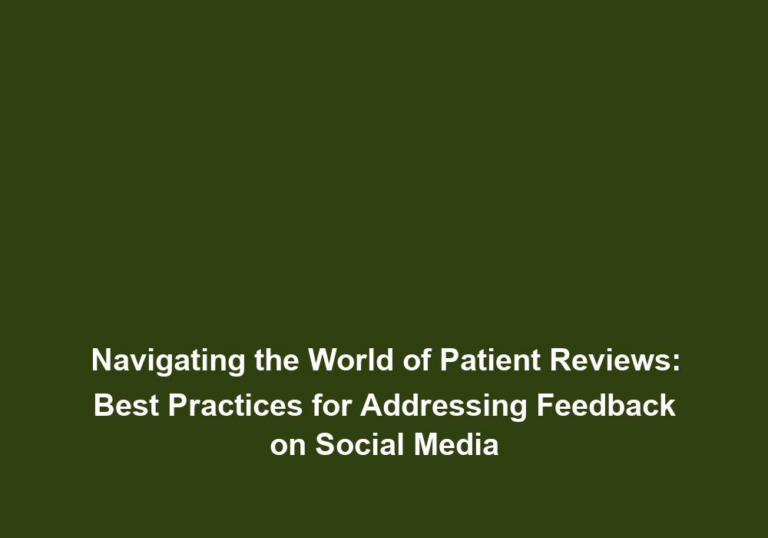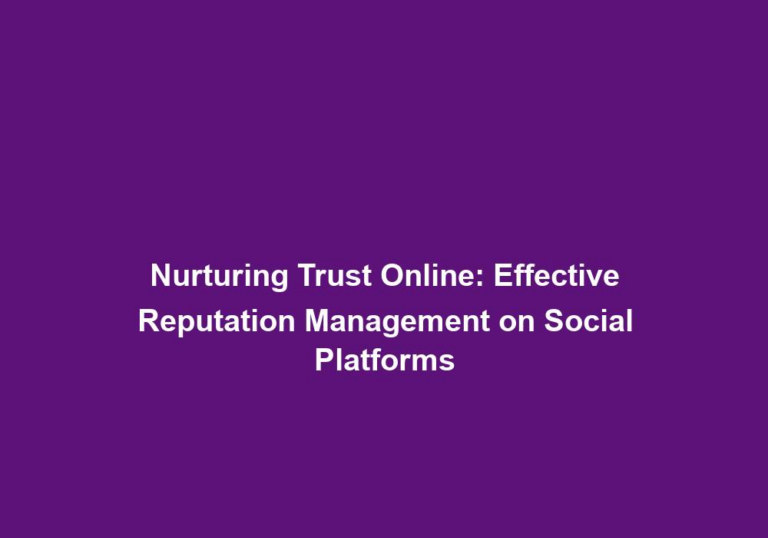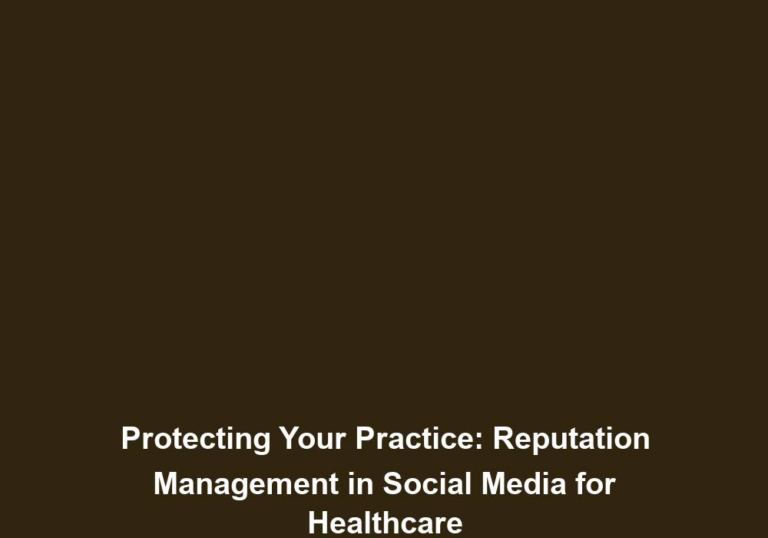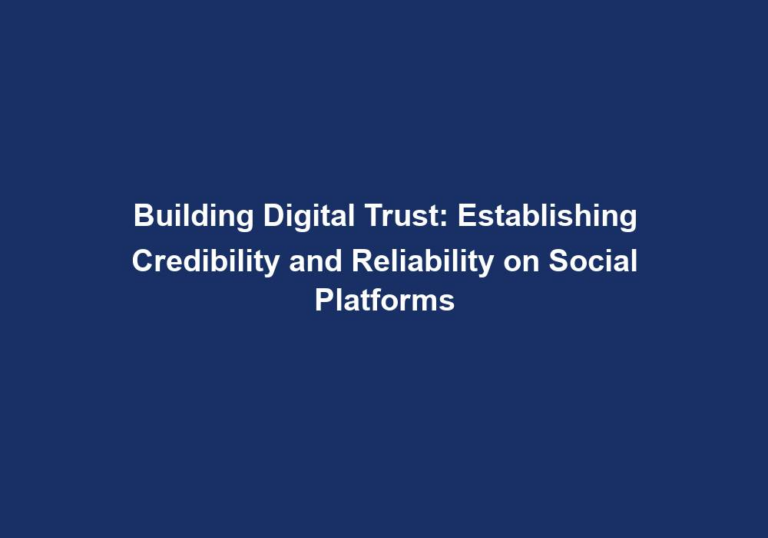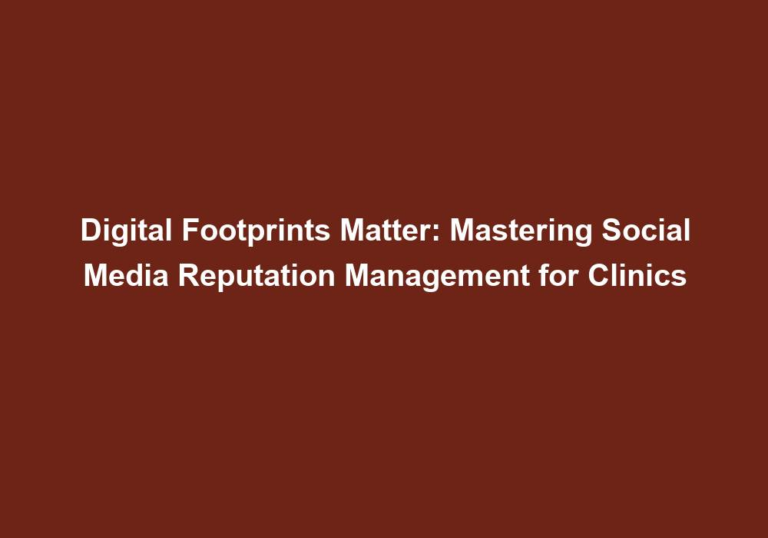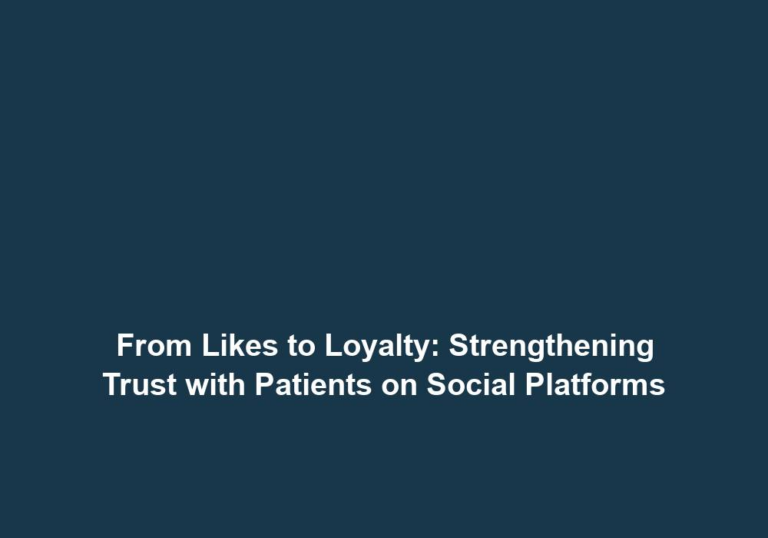Patient Voice Matters: Addressing and Leveraging Reviews in the Healthcare Sector
In today’s digital age, the voice of the patient has become increasingly important in the healthcare sector. Reviews and feedback from patients play a crucial role in shaping the reputation and success of healthcare providers. With the growing popularity of online platforms and social media, patients now have the power to share their experiences and opinions, influencing the decisions of others seeking healthcare services. In this article, we will explore the significance of patient reviews in the healthcare sector and discuss strategies to address and leverage these valuable insights.
The Power of Patient Reviews
Patient reviews provide an authentic and unbiased perspective on the quality of care provided by healthcare institutions. These reviews, whether positive or negative, give potential patients a glimpse into the experiences of others, allowing them to make informed decisions. According to a survey conducted by Software Advice, an overwhelming 94% of patients read online reviews before choosing a healthcare provider. This statistic highlights the importance of online reviews in the decision-making process.
Building Trust and Credibility
Positive patient reviews can significantly impact the reputation and credibility of healthcare providers. When potential patients come across multiple positive reviews, they are more likely to trust the quality of care provided by the institution. This trust is vital, as patients want to feel confident in their choice of healthcare provider. On the other hand, negative reviews can raise concerns and lead to a loss of trust. Therefore, it is vital for healthcare providers to actively monitor and address patient reviews to maintain a positive online reputation.
To build trust and credibility, healthcare providers can:
- Respond promptly and professionally to both positive and negative reviews, demonstrating a commitment to patient satisfaction.
- Address any concerns or issues raised by patients, showing empathy and a willingness to address the issue.
- Apologize if necessary and offer a resolution if possible, showing that the institution takes patient feedback seriously.
Improving Patient Experience
Patient reviews offer valuable insights into the strengths and weaknesses of healthcare services. By analyzing these reviews, healthcare providers can identify areas for improvement and take necessary steps to enhance the patient experience. Whether it’s addressing long wait times, improving communication, or enhancing the overall quality of care, patient feedback can guide healthcare organizations in their continuous pursuit of excellence.
To improve the patient experience, healthcare providers can:
- Streamline scheduling processes and reduce waiting periods based on feedback regarding long wait times.
- Provide additional staff training to improve communication and patient interaction.
- Implement process optimizations and adopt new technologies to better serve patients, based on feedback regarding service efficiency and convenience.
Addressing Patient Reviews
To effectively address patient reviews, healthcare providers must have a robust system in place that encourages patients to share their experiences and enables prompt responses from the institution. Here are some strategies to consider:
Encourage Patient Feedback
Creating a culture that values patient feedback is essential. Healthcare providers should actively encourage patients to leave reviews and provide feedback after their visits. This can be done through various channels, such as email surveys, in-person feedback forms, or dedicated online review platforms. By making it easy for patients to share their experiences, healthcare providers can gather a wealth of valuable feedback.
Encouraging patient feedback can involve:
- Sending personalized email surveys to patients after their visits, asking for their feedback on their experience.
- Providing in-person feedback forms at the facility, allowing patients to share their thoughts and suggestions.
- Partnering with reputable online review platforms to encourage patients to leave reviews and ratings.
Monitor Online Platforms
Healthcare providers should regularly monitor online platforms, including review websites and social media channels, to stay informed about what patients are saying. By being proactive and responsive to reviews, healthcare institutions can address any concerns or issues raised by patients. It is important to respond promptly and professionally to both positive and negative reviews, demonstrating a commitment to patient satisfaction.
Monitoring online platforms involves:
- Setting up notifications for new reviews on review websites and social media channels.
- Designating a team member responsible for monitoring and responding to patient reviews.
- Conducting regular searches on review websites to ensure all reviews are being addressed.
Addressing Negative Reviews
Negative reviews can be challenging for healthcare providers to handle, but it is crucial to face them head-on. When responding to negative reviews, it is important to acknowledge the patient’s concerns, apologize if necessary, and offer a resolution if possible. By showing empathy and a willingness to address the issue, healthcare providers can not only appease the dissatisfied patient but also demonstrate their commitment to improving the quality of care.
When addressing negative reviews, healthcare providers should:
- Respond promptly and professionally, acknowledging the patient’s concerns and expressing empathy.
- Apologize if necessary and take responsibility for any mistakes or shortcomings.
- Offer a resolution or steps to rectify the situation, showing a commitment to improving the quality of care.
Celebrating Positive Reviews
Positive reviews should not be overlooked or taken for granted. Healthcare providers should acknowledge and appreciate positive feedback from patients. Responding to positive reviews in a personalized and sincere manner not only shows gratitude but also encourages others to share their positive experiences.
To celebrate positive reviews, healthcare providers can:
- Respond to positive reviews with personalized and sincere messages of gratitude.
- Share positive reviews on social media platforms and the institution’s website.
- Highlight positive reviews in marketing materials to showcase the institution’s reputation for excellent care.
Leveraging Patient Reviews
Beyond addressing patient reviews, healthcare providers can leverage these insights to further enhance their services and reputation. Here are some strategies to consider:
Internal Performance Assessment
Patient reviews can serve as a valuable tool for internal performance assessment. By analyzing reviews and identifying recurring themes or issues, healthcare providers can make data-driven decisions to improve their operations. For example, if multiple patients mention long wait times, steps can be taken to streamline scheduling processes and reduce waiting periods.
To conduct internal performance assessments, healthcare providers can:
- Analyze patient reviews to identify recurring themes or issues.
- Use data from reviews to prioritize areas for improvement.
- Implement changes and monitor the impact on patient satisfaction based on subsequent reviews.
Quality Improvement Initiatives
Patient feedback can uncover areas that require improvement in healthcare services. By utilizing these insights, healthcare providers can initiate quality improvement initiatives aimed at enhancing patient experience and outcomes. This could involve staff training, process optimizations, or adopting new technologies to better serve patients.
To implement quality improvement initiatives, healthcare providers can:
- Develop action plans based on patient feedback to address identified areas for improvement.
- Provide additional training to staff members based on feedback regarding communication or service quality.
- Collaborate with relevant departments to implement process optimizations identified through patient reviews.
Marketing and Public Relations
Positive patient reviews can be a powerful marketing tool. Healthcare providers can leverage these reviews by featuring them on their website, social media profiles, and marketing materials. Sharing success stories and positive experiences can help build trust and attract new patients to the institution.
To leverage patient reviews for marketing and public relations, healthcare providers can:
- Highlight positive patient reviews on the institution’s website, creating a dedicated section for testimonials.
- Share positive reviews on social media platforms, accompanied by engaging visuals or patient stories.
- Incorporate positive patient feedback into marketing materials, such as brochures or advertisements.
Conclusion
In the healthcare sector, patient reviews hold immense value in shaping the reputation and success of healthcare providers. By actively addressing and leveraging patient reviews, healthcare institutions can enhance patient experience, build trust, and continuously improve their services. Embracing patient feedback as a valuable resource can lead to better outcomes, increased patient satisfaction, and a stronger position in the competitive healthcare landscape.


